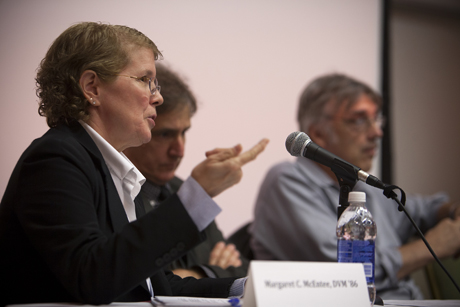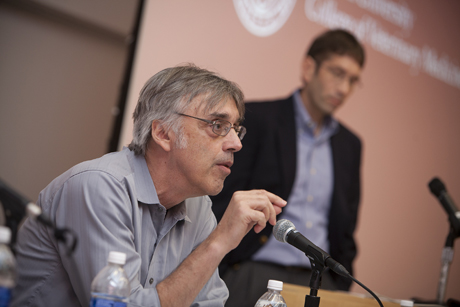Veterinary faculty share work to conquer cancer
By Carly Hodes


One-third of people, one-fourth of dogs and one-fifth of cats will develop cancer at some point during their lives, said Bob Weiss, associate professor of molecular genetics, moderating a panel discussion Oct. 25 about the future of cancer research for more than 70 Cornell University Council members and guests.
Cancer will kill more than 500,000 people in the United States this year, he said, and it is the leading cause of death in dogs over the age of two.
“Our faculty work at the intersection of multiple disciplines to understand the complexity of devastating diseases like cancer that affect millions of people and the animals we love each year,” said Weiss of the Cornell College of Veterinary Medicine. “Innovative thinking and collaborations are leading us to new therapeutic targets for cancer, from the discovery of new drugs designed to selectively silence cancerous cells to development of treatments designed to disrupt metastasis and others that target the source of newly transformed malignant cells.”
Panelist Rick Cerione, the Goldwin Smith Professor of Pharmacology and Chemical Biology, said his team works on better understanding the mechanisms enabling invasive cancer cells to move, which could lead to new treatments that stop metastasis. Scott Coonrod, associate professor of epigenetics, noted that his group works on developing new drug compounds that can shut down one of the main tools cancer cells use to turn on their out-of-control propagation and stop tumor development.
Margaret McEntee ’86, the Alexander de Lahunta Chair of the Department of Clinical Sciences, said that over her 23 years of veterinary oncology practice, she has treated species from snakes to horses and emphasized the importance of pet owners enrolling in clinical trials to fuel innovations at the Cornell Hospital for Animals. She added that the hospital’s growing DNA Bank has helped Cornell scientists find genetic underpinnings to diseases and develop better diagnostics, treatments and drugs.
In an overview of Cornell’s broad cancer-related work, Weiss pointed out that the Weill Cornell and NewYork-Presbyterian Hospital Cancer Center in New York City is working to become a National Cancer Institute (NCI)-designated facility. The cross-campus Center for the Microenvironment and Metastasis, he added, has developed an NCI-supported Physical Sciences Oncology Center to study the interaction of mechanical forces and chemical cues in cancer metastasis. Meanwhile, to empower the next generation of cancer researchers, the College of Veterinary Medicine sponsors the Comparative Cancer Biology Training Program Interdisciplinary training program, he added.
Carly Hodes ’10, MBA ’15, is a communication specialist at the College of Veterinary Medicine.
Media Contact
Get Cornell news delivered right to your inbox.
Subscribe